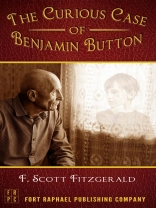F. Scott Fitzgerald created the novella ‘The Curious Case of Benjamin Button’ as a short story, originally published in Collier’s magazine in 1922.
It tells the tale of Benjamin, son of Roger Button, who was born as an old man and who, over the course of his life, miraculously ages backwards. Beginning life as an octogenarian in his crib, Benjamin grows ‘older’ while his body, conversely, appears younger and younger with each passing birthday. The story takes us through Benjamin’s entire life; his difficult adolescence, his marriage, life as a soldier and father and, ultimately, his inevitable descent into infanthood.
At once hilarious, frightening and satiric, Fitzgerald’s wonderful story has been adapted for both the stage and screen and is presented here in its original, unabridged format.
Over de auteur
F. Scott Fitzgerald was born Francis Scott Key Fitzgerald, on September 24, 1896 to Edward and Mary (‘Molly’) Fitzgerald in St. Paul, Minnesota.His father worked for Procter & Gamble and young ‘Scott’ (as he was called) shuttled between Buffalo, New York, West Virginia and Minnesota during his early life, eventually enrolling at Princeton. An author from an early age, Fitzgerald continued his literary pursuits at college and during his time in the Army. While enlisted, he met Zelda Sayre, whom he eventually married after a prolonged engagement.Fitzgerald began a career in advertising at Barron Collier, but struggled to remain financially solvent. He continued to write, finally revising an earlier novel into his first major publication, ‘This Side of Paradise, ‘ which was an immediate success. He continued writing short stories for a number of literary magazines, sometimes selling them to Hollywood studios to be adapted into films.Traveling to and from Europe, Fitzgerald struck up a friendship with a number of American expatriates living in Paris, most notably Ernest Hemingway, who often chided Fitzgerald for his ‘whoring’ his stories and novels to Hollywood.Zelda suffered from mental illness and Fitzgerald often drank to excess, leading to a volatile relationship. They relocated to Los Angeles so that Fitzgerald could continue working on movies, but the trip was brief and only exacerbated Zelda’s emotional and mental issues. Fitzgerald would eventually have Zelda placed in a series of mental hospitals, in which she remained – on and off -for the rest of her life.Fitzgerald returned to Hollywood in the 1930’s and enjoyed a lucrative career writing screenplays and contributing dialogue to various features for MGM, but his drinking worsened and led to his own mental deterioration. He suffered from tuberculosis and heart disease in his 30’s, eventually dying of a heart attack at 44.Ironically, Fitzgerald’s greatest novel, ‘The Great Gatsby, ‘ published in 1925, would not be recognized and revered as a literary masterpiece until well after Fitzgerald’s death.Zelda died seven years after Fitzgerald, when a hospital where she was receiving treatment burned to the ground.










